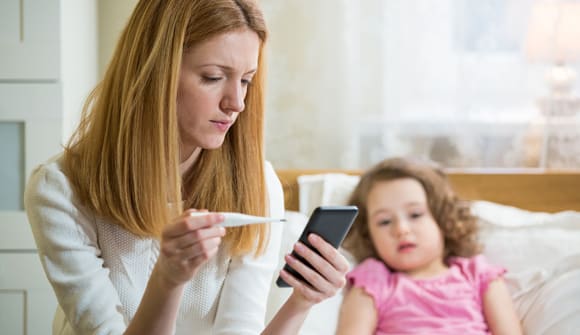What to do if your child is sick
Could it be COVID-19?
Article Author: Vikki Mioduszewski
Article Date:

Concern about coronavirus (COVID-19) is high, but the risk for serious illness to children seems to be low. So far, most reported cases of coronavirus have been in adults. Kids who do get it seem to have milder infections than adults or older people.
Experts are still learning about COVID-19, so we don't have all the information yet. Still, parents wonder what to do if their child gets sick.
What if my child gets a fever, cough, or sore throat? Could it be COVID-19?
- Do your best to stay calm.
- Call your doctor. Your doctor knows your child's health history and will know if your child has any special risks. The doctor will ask how your child is doing and if they've been around someone with known or suspected coronavirus. Your doctor's office will tell you what to do next and whether you need an in-person visit.
- Get a telehealth visit. If this option is available in your area, a health care provider can see your child while you stay at home. If you can, choose a telehealth provider who specializes in caring for kids. If the doctor thinks your child needs care right away, they will guide you on where to go. Check for telehealth in your area now, before anyone in your family is sick.
- Keep your child home. This keeps your child away from other germs. It also helps prevent your child from spreading the illness to others. If the doctor thinks your child might have coronavirus, the whole family will need to stay home.
- Keep other people and pets in the house away from your child as much as possible.
- Try to have one person only care for the sick child so others are not exposed.
If your child is over 2 years old and can wear a face mask or cloth face-covering without finding it hard to breathe, have them wear one when the caregiver is in the room. Don't leave your child alone while they're wearing a mask or cloth face covering. If your child can't wear one, the caregiver should wear one when in the same room. To see how to put on and remove face masks and coverings, clean them, or make your own cloth face covering, check the CDC's guide.
- If possible, have your sick child use a different bathroom from others. If that isn't possible, wipe down the bathroom often.
- Everyone in your family should wash their hands well and often. Wash with soap and water for at least 20 seconds, or use alcohol-based hand sanitizer.
- Use regular household cleaners or wipes to clean things that get touched a lot (doorknobs, light switches, toys, remote controls, phones, etc.). Do this every day.
- Help your child get plenty of rest and drink lots of liquids.
- Watch for signs that your child might need more medical help, such as trouble breathing, fast breathing, sleepiness, not being able to drink a lot of liquids, or signs of dehydration like peeing less than usual.
Should I get my child checked for COVID-19?
With the nonstop news coverage, it's easy to think that coronavirus symptoms are an emergency. But it's important not to run to the ER at the first sign of fever.
Instead, call your doctor or use telehealth if your child has:
- A fever
- A cough
- Sore throat
- Fast breathing
- Signs of dehydration, such as not peeing for 8-12 hours, no tears when crying, or being less active than usual
They'll help you know if you can care for your child at home or if you need to go to the doctor's office or the ER.
Go to the ER if your child:
- Has breathing problems. Look for muscles pulling in between the ribs or the nose puffing out with each breath.
- Is confused or very sleepy
Call 911 if your child is struggling to breathe, is too out of breath to talk or walk, or turns blue.
How do doctors test people for COVID-19?
Testing for COVID-19 is changing. Doctors, hospitals, commercial labs, local health departments, and the U.S. Public Health Service are working together to help get tests to the people who need them.
To test someone for coronavirus, doctors send a mucus sample from the nose and back of the throat to a lab. If the person coughs up mucus, doctors might send that for testing too.
If you think your child has symptoms of COVID-19, visit wolfsonchildrens.com/covid19 or baptistjax.com/covid19 to learn more.
How is COVID-19 treated?
Doctors and researchers are working on medicines and a vaccine for coronavirus. Most people with the illness, including children, get better with rest, fluids, and fever-reducing medicine.
What else should I know?
Keep doing these things to keep your family healthy:
- Wash hands well and often.
- Cover coughs and sneezes.
- Avoid contact with other people, especially those who are sick.
Source: KidsHealth from Nemours



